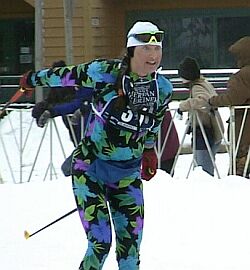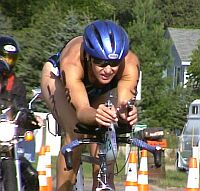Interview: Melinda Silbernick
By Dennis Nelson
January 2, 2002
 Melinda Silbernick started coaching at Apollo and Tech high
schools in St. Cloud, in the mid-80's. She later moved into
the Osseo district as the head coach at Osseo and then starting
another program at Maple Grove High. Silbernick retired last
spring from coaching at the scholastic level but is still
teaching.
Melinda Silbernick started coaching at Apollo and Tech high
schools in St. Cloud, in the mid-80's. She later moved into
the Osseo district as the head coach at Osseo and then starting
another program at Maple Grove High. Silbernick retired last
spring from coaching at the scholastic level but is still
teaching.
- Skinnyski: You're well known as a multi-sport athlete.
How did you get started?
Silbernick: I was teaching in St. Cloud and got started
in triathlon first. Phil Rogosheske got me going with
skiing as a cross-training discipline. Rogo was my inspiration.
Apollo was just starting a ski team, so I went there as
an assistant. I also worked with Rogo at Tech. This was
in the mid 80's.
- Skinnyski: Most of us associate you with the Osseo
teams.
Silbernick: Yes, I coached the longest there, both Osseo
and Maple Grove. I started the Maple Grove program with
twenty skiers, and when I left last year we had about
eighty kids.
- Skinnyski: So you've been through the skating-classic
cycle.
Silbernick: That's right, and I'm really glad that we
have both now, even though, as a coach, waxing and equipment
can get to be a pain. I started about the time classic
got left out.
- Skinnyski: As coaches, we tried combi skis to try and
accomodate both styles.
Silbernick: And I don't think combi skis are the answer,
especially for classic skiing.
- Skinnyski: How about the other changes in HS skiing?
Silbernick: As I said, I like the notion that kids can
do either or both of the techniques. I do wish we had
shorter distances for the middle school skiers. They can
get discouraged when they can't keep up at 3 or 5K paces.
Shorter distances, say 1K, would be great for them to
develop speed, but there are almost no races for middle
schoolers.
- Skinnyski: Speaking of racing, what are your thoughts
about older kids who opt for national-level competition?
One of your sons went into biathlon, I recall.
Silbernick: Jeremiah did. I told him he had to choose
between HS and the next level because I thought then,
and still do, that trying to do both is too much. I just
think there's way too much racing with both HS and USSA.
You want the kids to get to the next level but not to
take on too much. When he went to Germany it became a
"survival of the fittest" contest.
- Skinnyski: What attributes does a good HS coach need?
Silbernick: PATIENCE! Along with that, it's an individual
sport, and I always tried to deal with the kids that way.
- Skinnyski: What do you mean?
Silbernick: Well, I really tried to affirm kids for
individual goals and progress rather than just how the
team was doing. If they could lower their times over a
season, it was important to let them know that I noticed
and to affirm that. I could say, "I noticed you today,"
and they really liked that.
- Skinnyski: What was hard about coaching?
Silbernick: Deciding on the last spot or two for Conference
and Section teams. But the hardest was explaining to parents,
sometimes, why their son or daughter didn't letter. They
thought that, if the skier was working really hard, that
should be enough. I tried to have really clear requirements
for lettering but sometimes they weren't clear enough,
I guess. And coaching really is draining, sometimes to
the point of affecting my teaching.
- Skinnyski: Speaking of draining, we started out mentioning
your triathlon career. How is that going for you? I know
you've done the Hawaii Ironman and I've seen you on the
podium at Annandale several times.

Silbernick: I qualified for Hawaii again in Florida,
which is a qualifier in November for Worlds. It was a
good day for me. I had the second-fastest bike split.
The only woman who beat me was a German pro. I had the
fastest non-pro split. My overall time broke the divisional
record by one hour and eight minutes and they're checking
to see if it's a Master's record.
- Skinnyski: I guess that explains why you were nominated
for three different awards here. You won the "Divisional
Dominance" award for multi-sport athletes this time and
were nominated for Master of the Year and Performance of
the Year.
Silbernick: What that leads up to is Hawaii in October.
That's the goal.
- Skinnyski: Have you had good coaching?
Silbernick: I really haven't had much coaching. I think
what's important is to have a good training partner and
a clear idea of how to do your training in phases so that
you peak when you need to. I trained one full year for
Florida.
- Skinnyski: You aren't coaching HS now and I assume
your tri training is at a maintenance level. What are you
doing with your time?
Silbernick: Gear West asked me to coach their adult
group and I worked with the NW Running Club too. Adults
are great. They are so motivated and so appreciative of
any help we can give.
- Skinnyski: What's your motivation? I remember seeing
you limp away from the finish line at Mora a few years ago.
You said it was blisters.
Silbernick: I got them at Cannon Falls and they were
hurting me.
- Skinnyski: Well, that's my point. I spoke rather sternly
to you that day and you sort of shrugged it off. And I know
Ironman distances are absolutely grueling. What keeps you
going?
Silbernick: I really don't know. I do focus hard on
the race and not on the pain. It seems like I don't feel
the pain till it's over, and then I really do. Sprints
hurt me worse than endurance events do. Sprints can kill
me.
- Skinnyski: So you prefer longer ski races? What are
your favorites?
Silbernick: I treasure the Mora horses. I have six right
up where I can see them. I used to love the MinnFinn because
that was my first race, but now the Birkie is at the top.
The competition is great and the course always pushes
me to the limit.
- Skinnyski: Looks like we'll be seeing you staying active
for a long time to come.
Silbernick: Let's hope for more snow!

|
Dennis (Denny) Nelson coached at Coon Rapids High
School for 18 seasons before retiring. He's still very
active in the ski community, volunteering at Champlin
Park and area races, and can usually be found in the Fall
working out with the WAM-XC group. Denny has graciously
offered to do a series of interviews for us with some
of the legends in high school nordic coaching. |
|



